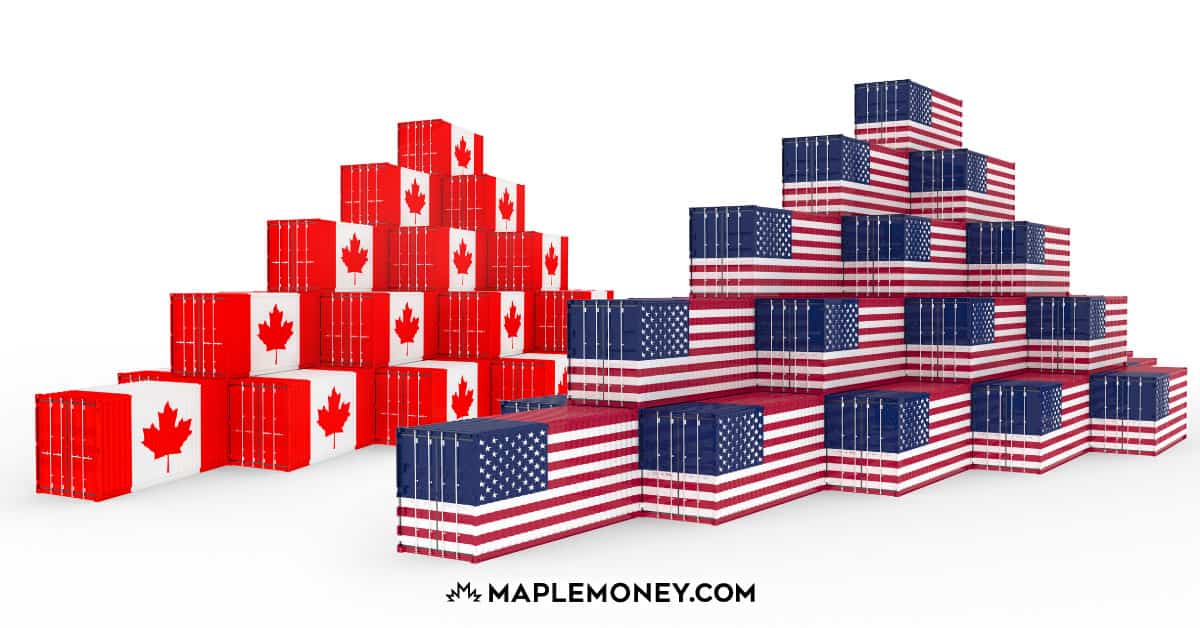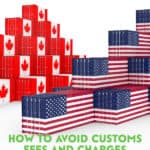How to Avoid Customs Fees and Charges from the USA to Canada

If you’re like most Canadians, you’re shopping online more than ever before. In fact, online shopping has more than doubled during the COVID-19 pandemic. And with more stores going online, not to mention an increase in free shipping, it’s hard to beat the convenience of shopping from the comfort of your home. However, if you’re not careful, you may be slapped with import taxes and other customs-related fees when you buy items that originate outside of Canada. This article will explain the different fees charged on imported items from the US, and ways to avoid the surprise costs when you shop.
Why Am I Charged Customs Fees?
Customs fees are charged on goods that are moving into Canada from other countries. These fees are put in place to protect the local economy and local businesses. If you could buy cheaper items outside Canada and avoid taxes and other fees, there wouldn’t be much incentive to shop local.
When you purchase items from the US, they may be subject to import taxes, brokerage fees, and even Canadian tax (GST) when they arrive. The fees vary based on various factors, including the value of the item and the country it originated from. Let’s take a closer look at the different costs you may incur.
Duty
Generally speaking, duties are charged on goods that are imported into the country. There isn’t a fixed rate; how much duty you pay will depend on several factors, including the existence of a free trade agreement between Canada and the originating country, the type and value of the goods, where they were made, etc.
Most goods coming from the US are not subject to duty because of the CUSMA (Free Trade) Agreement.
Estimating Duties
The Canada Border Services Agency has a helpful calculator on their website, that lets you estimate the duties you will pay on a shipment. If you’re unsure, I recommend trying it out.
Brokerage Fees
The brokerage fee is the fee charged by the broker for administering your shipment with the CBSA. There are different names for the fee, depending on the courier. For example, FedEx refers to brokerage fees as clearance entry fees. UPS calls them entry preparation fees.
You might be surprised to know that it’s the courier companies that look after the customs clearance of goods entering the company. They collect the various fees and pass them along to the CBSA on your behalf. How much you pay in brokerage fees depends on which courier is looking after the shipping. Some of the more common couriers are household names, like FedEx, DHL, and UPS.
Taxes
Taxes differ from duties in that they are applied to all goods sold in the country, not just items being imported. Duties are specific to imported goods. In Canada, you will usually be subject to pay a combination of the Goods and Services Tax (GST) and your respective Provincial Sales Tax (PST).
For example, if you live in Manitoba, you will be charged 5% GST and 7% PST on any imported goods that you receive. Some provinces pay a Harmonized Sales Tax (HST) which incorporates the GST and PST into one rate. In Ontario, for example, the HST is 13%.
Are There Any Exceptions to Customs Fees?
The answer is yes; there are exceptions. The Canada Border Services Agency monitors all international mail coming into Canada. They determine if duty and/or taxes must be applied to any goods being received. The Canada Border Services Agency waives duty and taxes on goods coming into Canada if the item(s) are valued under $20. The following items are not included in the exception:
- tobacco;
- books;
- periodicals;
- magazines;
- alcoholic beverages; and
- goods ordered through a Canadian post office box or a Canadian intermediary.
Another reason duties and taxes are being waived are if an item is considered to be a gift from a friend or relative. In this case, they must send it to you personally and indicate with a card or by other means that the item is a gift. This only applies to item values at $60 or less. If a gift is worth more than $60, you are responsible to pay the duty and tax on the amount over $60.
Tobacco, alcoholic beverages, advertising material, and items sent to you by a business cannot be considered a gift and are not exempt from duties.
Ways to Avoid Customs Charges in Canada
While it’s very difficult to altogether avoid import duties when you purchase goods from outside Canada, there are some things you can do to reduce duty charges.
1. Ensure the Product You’re Buying Was Made in the USA
It’s not good enough that the goods you purchased are being shipped from the US, they had to have been made there as well. For example, if you are buying clothing items from an American online retailer, but the clothes were made in China, customs duties will apply. Try to choose items made in the US, and shipped from the US.
2. Self-Clear Your Imported Goods
While this won’t always be possible, you can clear your imported goods directly with the CBSA, and avoid paying high brokerage fees to the middleman (UPS, FedEx, DHL). The process isn’t simple, but once you’ve done it successfully, it should be easier the next time.
Each courier company handles self-clearing differently. Essentially, however, you have to refuse delivery of the product to avoid paying the courier. Then, using your shipping tracking number, product receipt, and your ID, visit a CBSA office to pay the required charges.
CBSA will give you a receipt confirming that your items have cleared customs. Contact the courier company once more, confirm payment of taxes and duties (while avoiding their additional surcharges), and let them know that you are ready to receive your package. You can’t prevent duties, but you can reduce your costs.
3. Keep Purchases Under $20.
The CBSA doesn’t apply duty to items valued under $20. By keeping your imported goods under this amount, you won’t have to pay duties at all.
Final Thoughts on Customs Fees and Charges
Customs fees can be a hidden cost that springs up on you at the last second, just as you receive items you purchased online. The surprise charges can put a damper on the good feelings you had about a great deal you got or the fact that the shipping was free. Consider the strategies I’ve shared above to save money, and always consider where a product was manufactured before confirming your purchase.


Comments
I always try to have things from the U.S. shipped via USPS. That way Canada Post clears the item and only charges $10.00 for the service rather than the $50.00 plus I’ve seen from other delivery companies. Not always available as an option but worth opting for if it’s available.